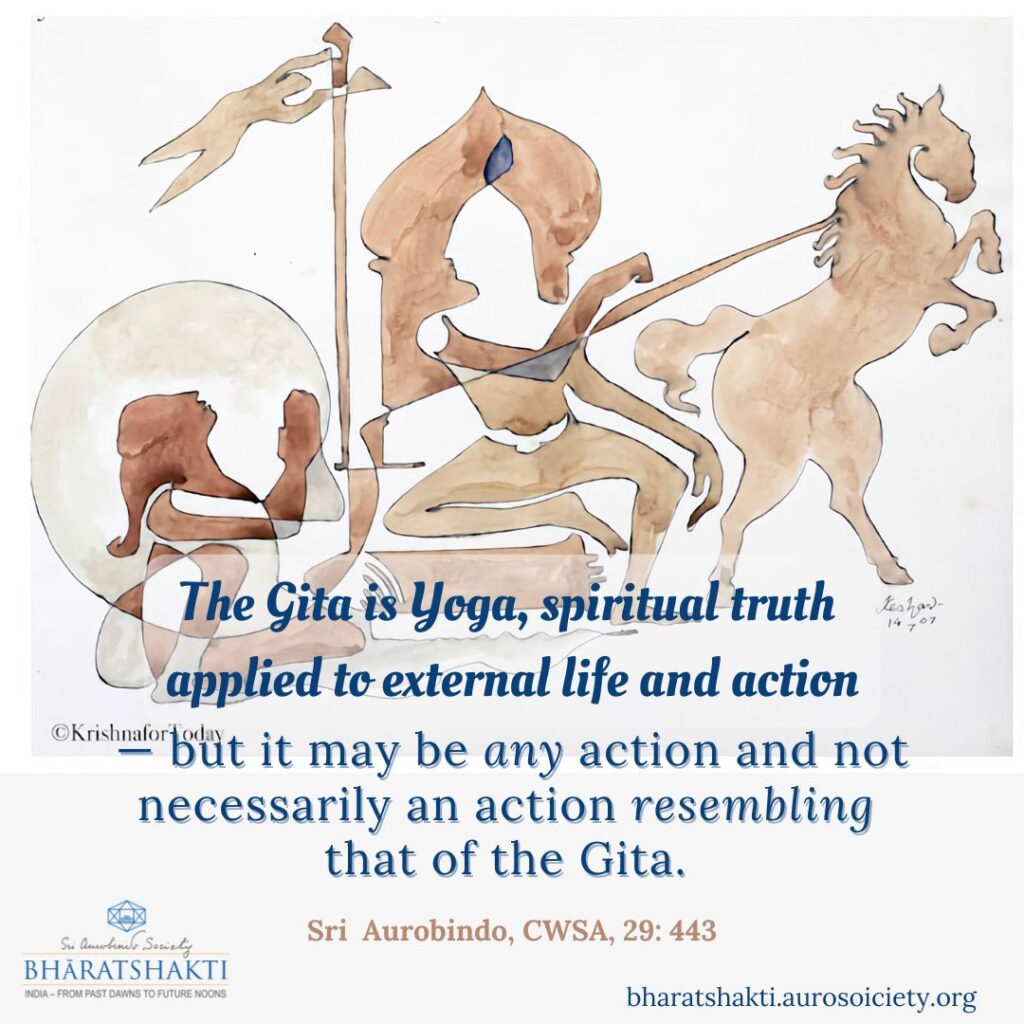Date: May 6, 2025
Part 4: Sānkhya Yoga – I
Continued from Part 3
Chapter 2 of Bhagavad Gita begins with Sri Krishna giving a jolt to Arjuna when he asks – How and from where has this stain and darkness of the soul entered into you in the hour of difficulty and peril? In order to bring him out of the state of a deep dejection and to remind him of his real nature as a heroic warrior, Sri Krishna reminds Arjuna this is not the way cherished by the noble Aryan man. This mood does not come from the divine regions nor does it lead to the world of light, and on earth such dejection equals the forfeiting of glory. Sri Krishna gently rebukes Arjuna that he must not fall from the virility of the fighter and the hero, and that he must shake off this paltry faintheartedness and arise to do his given work, kartavayam karma.
Arjuna again gives his ethical arguments, speaks of his dilemma over fighting with his elders, gurus, uncles and cousins and whether any victory gained after killing one’s loved ones will be worth enjoying.
“He attempts still to justify his refusal of the work and puts forward in its support the claim of his nervous and sensational being which shrinks from the slaughter with its sequel of blood-stained enjoyments, the claim of his heart which recoils from the sorrow and emptiness of life that will follow his act, the claim of his customary moral notions which are appalled by the necessity of slaying his gurus, Bhishma and Drona, the claim of his reason which sees no good but only evil results of the terrible and violent work assigned to him.”
~ Sri Aurobindo, Essays on the Gita, CWSA, Vol. 19, p. 60
This complete inner bankruptcy embracing his entire being compels Arjuna to take refuge as a disciple with Sri Krishna. Feeling completely bewildered in his heart and mind, he surrenders himself and says, “give me…that which I have lost, a true law, a clear rule of action, a path by which I can again confidently walk. He does not ask for the secret of life or of the world, the meaning and purpose of it all, but for a dharma.” (ibid., p. 26)

It is significant that the starting note of the teaching of Bhagavad Gita is surrender, and that again is its last note. Now that Arjuna has surrendered himself completely to Sri Krishna and is asking him to teach him the clear rule of action, Sri Krishna shows him the path to pursue.
Sri Krishna’s first answer revolves around the highest ideas of the general Aryan culture in which Arjuna has been educated. He explains the philosophic and moral conceptions of the Vedantic philosophy and the social idea of duty and honour which formed the ethical basis of Aryan society. He reminds Arjuna that physical life and the death of the body were not the primary realities, and that all the people whose approaching death Arjuna mourns have lived before and will live again in the human body. As the soul passes physically through childhood and youth and age, so it passes on to the changing of the body. Going deeper into Vedantic knowledge, Sri Krishna teaches Arjuna:
“That which really is, cannot go out of existence, though it may change the forms through which it appears, just as that which is non-existent cannot come into being. The soul is and cannot cease to be. …Finite bodies have an end, but that which possesses and uses the body, is infinite, illimitable, eternal, indestructible.”
~ ibid., p. 62
Arjuna must know that because death is certain for the born, and birth is certain for the dead, therefore what is inevitable ought not to be a cause of his sorrow. He must also know and live another important truth of life, says Sri Krishna. That truth is that it is the Eternal who manifests itself as the soul of man “in the great cycle of its pilgrimage with birth and death for milestones”. In this pilgrimage of the soul, all circumstances of life — whether happy or unhappy — are means of the soul’s progress, opportunities even for battle and eventual victory. The final home for the soul is the immortality to which it is constantly traveling and worlds other than the terrestrial world are its resting places.
As these truths are too high for Arjuna to fully grasp, especially given his current state of mind, Sri Krishna changes his tactic at this point and reminds him of the ideal of Kshatriya-hood as envisaged by the noble Aryan culture. He tells him that to battle for the right is the true object of Kshatriya’s life. The greatest happiness for Kshatriya is when he finds a cause for which he is willing to even lay down his life, or by victory wins the crown and glory of the hero’s existence.
“Battle, courage, power, rule, the honour of the brave, the heaven of those who fall nobly, this is the warrior’s ideal. To lower that ideal, to allow a smirch to fall on that honour, to give the example of a hero among heroes whose action lays itself open to the reproach of cowardice and weakness and thus to lower the moral standard of mankind, is to be false to himself and to the demand of the world on its leaders and kings.”
~ ibid., p. 65
By giving Arjuna the higher knowledge of self and the world, Sri Krishna shows the direction in which Arjuna must proceed; where his social duty and the ethical standard of Kshatriya-hood point him. Arjuna must rise to a higher and not sink to a lower ideal.
